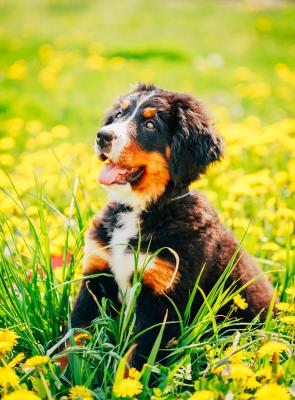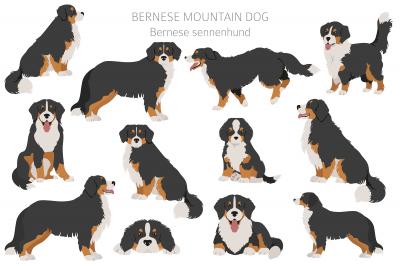Mini Bernese Mountain Dog: Comprehensive Traits & Care Guide

This guide will provide the necessary knowledge to make an informed decision when choosing a mini Bernese Mountain Dog as your next pet. These adorable dogs are created through crossbreeding techniques and possess unique physical characteristics that set them apart from their standard-sized counterparts.
As we delve into the world of mini Bernese Mountain Dogs, we’ll explore their increasing popularity and distribution across various regions. We’ll also discuss crucial aspects for first-time owners such as early training, socialization, grooming needs, shedding management, and exercise requirements.
Furthermore, understanding the personality traits and temperament of these intelligent and loving dogs is vital in ensuring a harmonious relationship with your new pet. This includes their playfulness, loyalty, friendliness towards children, trainability as well as compatibility with other animals in the household.
Last but not least, we’ll cover feeding guidelines and diet considerations tailored specifically for mini Bernese Mountain Dogs along with discussing their average lifespan expectancy and common medical concerns related to this breed. By gaining a thorough understanding of these captivating canines’ needs and quirks before bringing one home will ensure a happy life together for both owner and dog alike.
Table of Contents:
- Mini Bernese Mountain Dog Characteristics
- Crossbreeding with Small Dog Breeds
- Inheriting Traits from Both Parent Breeds
- Popularity and Common Locations
- First-Time Pet Owner Considerations
- Breed-Specific Concerns for Mini Bernese Mountain Dogs
- Personality & Temperament of Mini Berneses
- Interaction with Children & Other Pets
- Size Matters: Mini Bernese Mountain Dogs
- Grooming Requirements
- Feeding Your Mini Bernese Mountain Dog: Tips and Guidelines
- FAQs in Relation to Mini Bernese Mountain Dog
- Conclusion
Mini Bernese Mountain Dog Characteristics
The Mini Bernese Mountain Dog is a smaller version of the powerful and loyal giant Bernese Mountain Dog breed, created through crossbreeding with other small breeds such as the Cavalier King Charles Spaniel and the Miniature Poodle.
Crossbreeding with Small Dog Breeds
Mini Bernese Mountain Dogs are a result of crossbreeding with smaller breeds, creating a more manageable size for pet owners while retaining their working dog instincts.
Inheriting Traits from Both Parent Breeds
- Silky Coat: Mini Bernese Mountain Dogs have a thick yet silky coat that requires regular grooming.
- Loving Dogs: These intelligent dogs are great family pets who are eager to please their owners.
- Dogs Friendliness: While they may exhibit some guarding tendencies, they are generally friendly towards strangers if properly socialized at an early age.
Popularity and Common Locations
The Mini Bernese Mountain Dog is gaining popularity worldwide for their friendly nature, loyalty, intelligence, and compatibility with families. These adorable dogs can now be found across continents, thanks to regional breeding programs and growing global interest.
- Regional breeding programs: Breeders around the world are producing healthy and well-tempered miniatures that maintain the endearing qualities of standard Bernese Mountain Dogs.
- Growing global popularity: Mini Berneses are becoming increasingly sought-after in regions where breeding programs have been established or popularized by local enthusiasts.
If you’re considering adding one of these loving dogs to your family, research reputable breeder options nearby or even explore adoption possibilities through rescue organizations specializing in mixed breeds like Miniature Poodle mixes.
First-Time Pet Owner Considerations
As a first-time pet owner, you might be considering a mini Bernese mountain dog, and that’s a great choice. These adorable dogs make great family pets, but it’s important to understand their playful nature and the need for early obedience training and socialization.
Importance of Early Training
Starting basic obedience training at a young age is crucial for shaping your mini Bernese’s behavior and preventing unwanted habits from developing. You can enroll your puppy in puppy training classes or work with an experienced trainer who understands the unique needs of smaller breed dogs.
Socialization for Successful Integration
- Introduce your mini Bernese to various people, places, and situations early on to help them become well-rounded adult dogs.
- Schedule playdates with other puppies or friendly adult dogs so they learn how to interact appropriately with fellow canines.
- Taking part in group activities such as dog sports is another excellent way for your mini Bernese mountain dog to socialize while staying active.
Incorporating these considerations will ensure that both you and your new furry friend enjoy a happy life together.
Breed-Specific Concerns for Mini Bernese Mountain Dogs
Mini Bernese Mountain Dogs, like any mixed breed, may face certain health risks due to their genetic makeup.
- Hip Dysplasia: A common issue in large dog breeds like the standard Bernese Mountain Dog that can also affect miniature versions.
- Elbow Dysplasia: Another joint problem often seen in big dogs but may occur in smaller sizes as well.
- Eye Disorders: Both parent breeds are prone to various eye problems such as cataracts or progressive retinal atrophy (PRA).
It’s important to find reputable breeders who prioritize health screenings and ethical breeding practices to minimize the risk of these health issues.
Resources like the American Kennel Club Breeder Programs can provide guidance on finding reputable breeders near you.
Personality & Temperament of Mini Berneses
The temperament of Mini Bernese Mountain Dogs is friendly, outgoing, and eager to please their owners.
These intelligent dogs inherit traits from both parent breeds, making them relatively easy-to-train pets compared to some other breeds. However, it’s essential that basic obedience training and socialization start at a young age so they can adapt well into family life.
Friendly nature
Miniature Bernese Mountain Dogs are known for their loving nature, which makes them excellent companions for families seeking a loyal addition. Their gentle disposition ensures they get along well with children as well as other household pets.
Intelligence and trainability
- Dog sports: Mini Bernese mountain dogs tend to have the potential to excel in various dog sports such as agility or obedience competitions.
- Eager learners: With proper guidance from an experienced trainer or dedicated owner, these intelligent dogs can quickly pick up new commands and tricks.
- Socialization: Early exposure to different environments, people, and animals will help your Miniature Bernese Mountain Dog become a confident adult dog who enjoys meeting new friends.
Interaction with Children & Other Pets
The gentle and loving nature of mini Bernese mountain dog puppies makes them a perfect addition to families with children. Their friendly demeanor allows them to get along well not only with kids but also other household pets, making them excellent companions for those seeking a loyal and affectionate furry friend.
Compatibility with Children
Bernese Mountain Dogs, including their miniature counterparts, are known for being patient and tolerant around children. They enjoy playing games like fetch or tug-of-war, which can help create strong bonds between the dog and your little ones. However, it’s essential always to supervise interactions between young children and any dog breed to ensure safety on both sides.
Coexistence with Other Pets
- Dogs: Mini Berneses tend to have no issues getting along with other dogs in the household as long as they are properly socialized from an early age.
- Cats: While some mini bernedoodles may have a natural prey drive towards smaller animals like cats due to their working dog heritage, proper introduction techniques can help foster harmonious relationships among all your pets.
- Rodents & Birds: As intelligent dogs that adapt quickly to new situations, mini Berneses can learn how to coexist peacefully even with non-canine family members if given appropriate guidance during introductions.
Size Matters: Mini Bernese Mountain Dogs
Mini Bernese mountain dogs are a crossbreed of the standard Bernese mountain dog and smaller breeds like the Cavalier King Charles Spaniel and Miniature Poodle, resulting in a smaller version of the breed.
Mini Bernese mountain dogs can reach heights of up to 27 inches and weigh around 115lbs, though their size may differ depending on factors like genetics, diet, and exercise.
- Bigger households: Larger Mini Berneses might be more suitable for families that have ample space for them to roam around freely.
- Apartments: Smaller-sized Mini Berneses could make great family pets even if you live in an apartment setting since they require less room than their larger counterparts.
- Lifestyle compatibility: The smaller size of these loving dogs makes it easier for them to adapt well into various lifestyles without compromising their adorable appearance.
Mini Bernese mountain dogs are intelligent, loving, and make great family pets with their silky, thick, double coat. Consult with a reputable breeder or veterinarian to find the perfect mini Bernese puppy for you.
Grooming Requirements
Grooming mini Bernese mountain dogs good is a must to keep their thick coats healthy and shiny.
Maintaining Coat Health Through Brushing
Brush your mini Bernese at least 2-3 times per week to keep their coat silky and tangle-free.
Shedding Management
- Bathing: Bathe your dog every 4-6 weeks with a gentle shampoo formulated for thick-coated breeds.
- Deshedding Tools: Use grooming rakes or combs to remove excess hair during shedding seasons.
- Frequent Groomer Visits: Schedule visits to professional groomers every few months for thorough grooming sessions.
Mini Bernese mountain dogs make great family pets and are a smaller version of their larger counterparts. They have an adorable appearance with a thick, double coat inherited from their parent breeds, the Bernese Mountain Dog, Cavalier King Charles Spaniel, and Miniature Poodle.
These intelligent and loving dogs tend to be good with children and excel in dog sports. When looking for a mini Bernese mountain dog breeder, make sure to find a reputable one to ensure you get a purebred dog with a good temperament.
Overall, mini Bernese mountain dogs are a great choice for those who love big dogs but prefer a smaller size.
Feeding Your Mini Bernese Mountain Dog: Tips and Guidelines
A healthy diet is key to keeping your mini Bernese mountain dog in top shape, so choose high-quality food from reputable brands and avoid overfeeding to prevent obesity.
- Portion control: Follow age guidelines from your vet or pet nutritionist to determine how much food to give your dog.
- Diet variety: Mix it up with lean proteins, healthy fats, and complex carbs, and consider a mix of dry kibble and wet food.
- Treats in moderation: Stick to low-calorie options like fresh fruits and veggies to avoid weight gain.
Consult with a trusted professional like an experienced breeder or veterinary expert for specific dietary recommendations tailored to this unique breed.
FAQs in Relation to Mini Bernese Mountain Dog
Is the mini Bernese Mountain Dog a good choice as a family pet?
These smaller versions of the standard breed possess similar physical characteristics and are adaptable to various living environments. While they have moderate trainability, consistency and patience during training sessions will yield better results. This is a great choice for families looking for a canine friend.
What is the lifespan of a mini Bernese Mountain Dog?
Average lifespan expectancy: Mini Bernese mountain dogs typically live between 10-15 years.
Conclusion
Looking for a furry friend that’s playful and loyal? Consider a mini Bernese mountain dog! Miniature Bernese mountain dog training early on and socialization are key to ensuring good behavior habits, but with proper care, these dogs make great companions for families with children or other pets.
Make sure to keep up with grooming, exercise, and diet considerations to maintain their health and happiness. While there may be some medical concerns associated with this breed, the average lifespan expectancy is relatively long.
Ready to add a mini Bernese mountain dog to your family? Keep these characteristics in mind to provide them with the best possible care.

One Response to Mini Bernese Mountain Dog: Comprehensive Traits & Care Guide